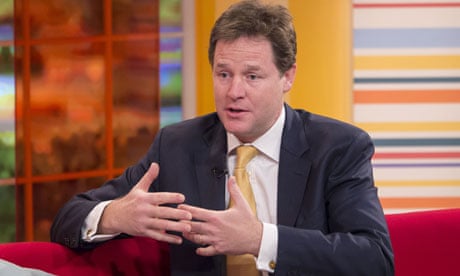Home Office ministers fear that the Liberal Democrats may veto the latest version of the so-called "snooper's charter" and are privately warning that Nick Clegg will be taking a major risk at a time of terrorist attacks in the US, and instability in the middle east.
Theresa May, the home secretary, has redrawn her proposed snooper's charter legislation – the communications data bill - to monitor internet and social media use and is battling to get it included in the Queen's speech on 6 May.
Home Office sources were pointing to the ever varied way in which criminals are using the internet to plot crimes and attacks. Liberal Democrat sources say Clegg, whose previous intervention sent May's original draft bill back to the drawing board, is currently examining the new proposals to see if he can back them as a "proportionate and necessary" response to the problem. The Lib Dem leader will be hoping that he can dampen any controversy until at least after the county council elections next week.
Liberal Democrat activists, angry at the leadership's decision to give the go-ahead to secret courts, are already warning that they will not tolerate another assault on their party's reputation for protecting civil liberties. Richard Morris, an influential activist, wrote on his blog this week: "If the Westminster party thought the grassroots gave them a hard time on civil liberties before, just try and propose some legislation that does anything but roll back the state's powers in this area. You haven't seen anything yet."
The "snooper's charter" is expected to be on the agenda for home affairs committee of the Cabinet, chaired by Clegg, when it discusses the contents of the Queen's speech, which outlines the government's legislative programme for the next session of Parliament.
It is understood that the home secretary's new proposals include significant concessions. She has repeatedly told the Commons that the rewritten bill will meet the substantive concerns raised by peers and MPs.
May's new proposals are believed to include:
Narrowing the scope to give police access to types of communications data that there is only a current and pressing need for. Ministers are believed to be ready to concede that powers to collect and access new and significant gaps in data can be bestowed if and when they emerge through a "super-affirmative" parliamentary order that MPs must vote on.
New safeguards for the controversial "request filter", which privacy campaigners argue mark a new extension of the database state, and which funnels requests to communications service providers such as BT, Virgin Media, Google, for access to data.
A new more robust costing figure for the project. The price tag is expected to be in the billions, but could be lower than the current estimate if the programme is scaled back.
A new round of consultations has been carried out with privacy campaigners and the internet industry, although some have argued that it was less than meaningful without the disclosure of crucial details.
However the new proposals are believed to have included no real movement on the power of the police to access individual internet and mobile phone histories.
The decision to redraft the bill came after a joint scrutiny committee of both houses of parliament delivered a withering verdict on the original Home Office legislation, describing it as "overkill" and warning that it "tramples on the privacy of British citizens".
The scrutiny committee, which included Lord Armstrong, a former cabinet secretary, also described its estimated price tag of £1.8bn over 10 years and much of its background analysis as "fanciful and misleading".
A Liberal Democrat source said they were discussing the issue now: "Nick [Clegg] had significant concerns about the draft bill and insisted it be put before the joint committee. That is what we are currently discussing in government."
Julian Huppert, the Lib Dem backbench home affairs spokesman, said: "It is clear that the Home Office has got this wrong. We should not spend well over a billion pounds keeping track of which websites everyone goes to. And if we become the first country to force internet providers to collect data from overseas providers, the rest of the world will follow. We would encourage authoritarian countries to snoop on their citizens.
"The Home Office has not done the basic work needed to see how the existing data is used. Far more could be done to use existing data more effectively, and the money could be spent better to support policing."



